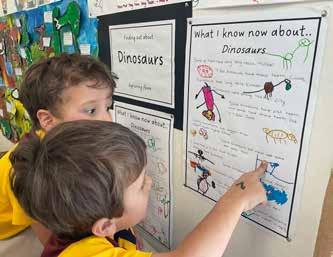
3 minute read
Inquiry and reflection over life's big questions
Mrs Racquel Cumming, Kindergarten Teacher ELC Coordinator
In the Early Years at Scotch College, we develop our holistic learning programme through the lens of the IB Primary Years Programme and the Early Years Learning Framework.
We use play as the vehicle to drive our co-constructed units of inquiry, ensuring the children’s wonderings and questions provide the springboard into our investigations. We encourage children to ask big questions and together create thought-provoking learning opportunities to explore the concepts behind these questions.
Some of the big questions we investigated during our ‘How the World Works’ unit of inquiry include, “How big is the ocean and when does it stop?”, “How do computers work?”, “How does the ice-skating place get the ice so big?”, “How did the dinosaurs die?” and “How do volcanoes explode?” For our young learners the focus isn’t necessarily finding the answers to their big questions, but gaining a greater understanding of the concepts which underpin each question, in an age-appropriate way. While exploring these concepts we are further developing each child’s language, physical, cognitive, and social/emotional skills. Our goal is to engage and motivate the children to think deeply and develop a strong desire to want to find out more about the world around them, while building their agency to design ways to get there.
During this inquiry, with such a range of big questions, we chose to spend two weeks investigating each topic. The children sought information through picture books and photos and explored concepts through guided and free play, manipulating a range of tools, resources, toys, and materials. We worked in collaboration with Mrs Clancy, our STEM teacher, to develop several child-initiated experiments and investigations such as forming and melting ice, erupting volcanoes,
and launching rockets. For some of these big questions we needed help from experts, so we reached out to our parents and local community and were excited to welcome Thomas’ dad to help us learn more about electrical engineering, Hugo’s grandpa to help us learn more about farm machines, and some of our wonderful facilities team to help with our woodworking skills.
At the end of the two-week mini-inquiry, we reflected on our learning through discussions, conversations and drawings, with each child sharing their new understanding of the big question as well as any further questions
the inquiry provoked. Parents reported their children were also sharing their new learning at home, so we invited our families to join us at Kindy for a Learning Journey. Here, each child enthusiastically walked their parents through photo displays of the inquiry and explained their new understanding of the big questions around ‘How the World Works’.










